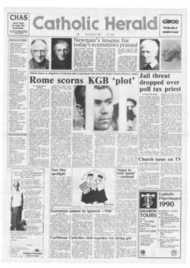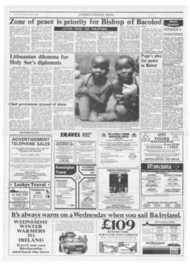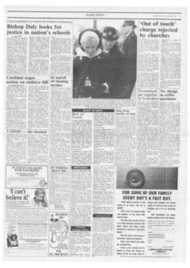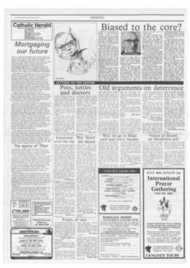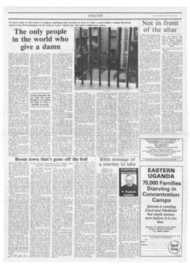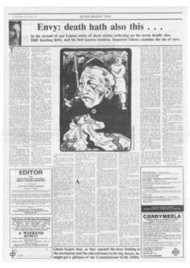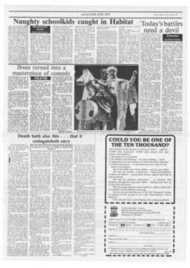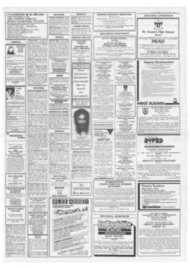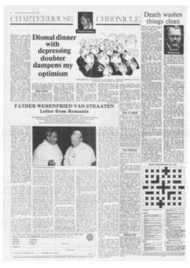Page 1, 9th March 1990
Page 1
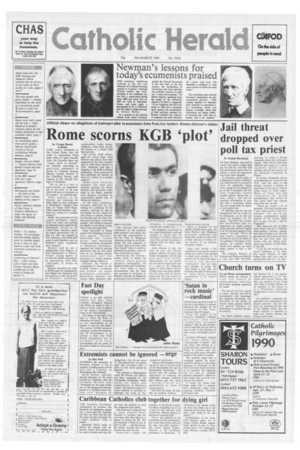
Report an error
Noticed an error on this page?If you've noticed an error in this article please click here to report it.
Tags
Share
Related articles
Vatican Breaks Silence On Agca
John Paul In Assassination Cover-up
Cia Orders To Agca
Cia Linked To '81 Papal Assassination
New Case Against Papal Assassin
Rome scorns KGB 'plot'
by Viviane Hewitt in Rome LAST week's revelation in the United States that the order to assassinate Pope John Paul II came directly from the Kremlin does not "touch, move or interest" the Vatican, according to unofficial comments in Rome by Cardinal Jacques Martin, former Prefect of the Pontifical House, and Deacon of the Sacred College of Cardinals.
"For us, this is a story of scarce interest, an imaginative tale of an event of the past which will have no influence on the present", the cardinal said.
Other members of the hierarchy also minimised the claim, made at a press conference in Washington's National Press Club, by former KGB Major, Viktor Ivanovich Sheymov, who Pope of a citizen of a socialist country?"
Under the protection of the Central Intelligence Agency (CIA) ever since, and awarded an American merit medal for his information services to the United States, Sheymov claims the papal assassination bid of May 13, 1981 was ordered by Yuri Andropov, then KGB chief under Leonid Brezhnev and, on Brezhnev's death, Communist party secretary.
Sheymov said he saw a cablegramme from Moscow to KGB headquarters in Warsaw, Poland, urging agents to provide all possible information on approaching John Paul "physically, as closely as possible".
Sheymov described the order as KGB jargon for assassination and alleged that Andropov had been anxious to halt the growth of Poland's rebellious independent trade union. Solidarity, whose birth, he felt, the election of a Polish Pope had nurtured.
The former KGB officer, aged 43, whose flight from Moscow was said to have been organised by the CIA, revealed that on John Paul's election in 1978, Andropov had sent a telegram to the KGB in Poland demanding: "How could you all have permitted the election as Pope of a citizen of a socialist country?
Rome curia hierarchy members this week were privately accusing the Soviet defector, who was given a false name in the States complete with disguise including an unconvincing blonde wig, of fishing for publicity.
At the press conference, Sheymov admitted he was looking for a publisher for his memoirs, although he said he had spoken out now,. despite the real climate of détente between the Kremlin and the Holy See, because he had been "silent long enough" and wished to reassure his family in the Soviet Union that he was alive and well.
Some hierarchy in Rome agreed with allegations in Soviet news agency "Novosti" despatches that "certain groups" were obstructing Vatican and Soviet acceleration of diplomatic procedures, suggested last week by growing speculation that the two states were set to nominate interim ambassadors until full restoration of formal relations (Catholic Herald, March 2).
Officially, the Vatican is maintaining its silence on the ex-KGB officer's revelations and neither the papal mouthpiece newspaper, Osservatore Romano, nor Vatican Radio dedicated them space or air time.
The Vatican has never commented on the would-be papal assassin's own claims that he had been commissioned to kill the Pope by Bulgarian "uthorities acting on the KGB's behalf. The only statement on the affair came from Pope John Paul himself when he publicly pardoned his attacker, whom he also visited later in prison.
Reinforcing the Vatican's evident desire to defuse the clamour which greeted Sheymov's declarations, the Bulgarian Episcopal Conference this week made a timely announcement that the Pope had accepted its invitation to Bulgaria, and that the Bulgarian government had promised every assistance in guaranteeing security for a papal visit.
The Bulgarian connection in the papal assassination attempt emerged 18 months after the shooting in St Peter's Square as John Paul greeted thousands of pilgrims from his white, opentopped jeep.
After refusing to talk, the then 26 year old Turkish gunman, Mehmet All Agca, told Italian investigators that he had been paid three million Deutschmarks for the murder bid. He said he received the cash in a hotel in the Bulgarian capital of Sofia from a known Turkish arms and drugs dealer, who has since died of natural causes and who was known to operate on commission for the Bulgarian secret services.
Agca, a member of the rightist Turkish terror gang, the Grey Wolves, said Bulgarian government authorities had helped him escape to Italy from a death sentence in Turkey for the murder of an Ankara newspaper editor.
Agca, now serving a life sentence in a top security central Italian jail, said he had decided to speak after claiming for 18 months that he had acted alone, because the murder "contractors" had not kept their promise to spring him from prison a year after the shooting. He said he had known he faced being arrested immediately in St Peter's Square.
blog comments powered by Disqus


